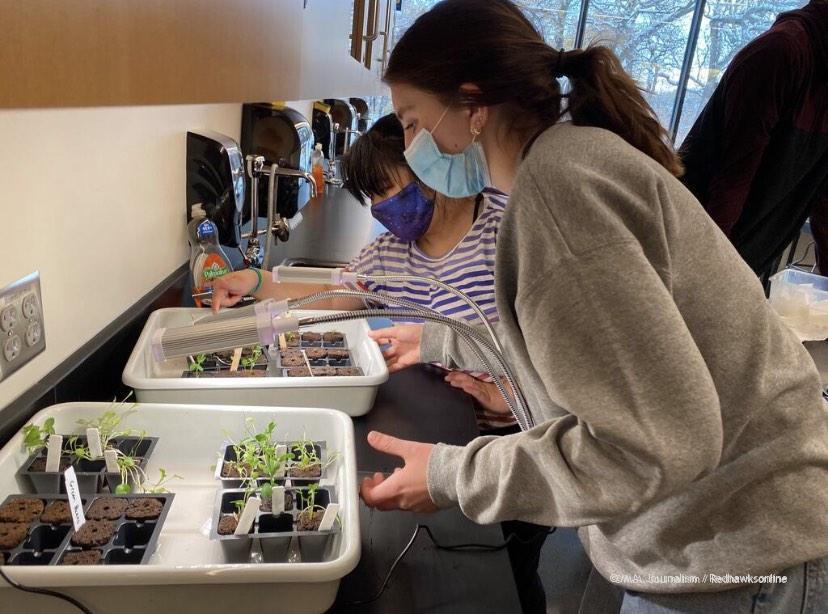ISS team looks to tackle three projects this year
Due to COVID-19 restrictions and social distance mandates, the International Space Station (ISS) class has faced challenges beyond the usual obstacle of designing an experiment to be conducted in space. In order to engage each student in the large class while abiding by COVID precautions, the class has decided to work on three different projects this year.
Calcium carbonate crystals
The 2019-2020 ISS team had designed an experiment to grow calcium carbonate crystals in space to further understand how kidney stones form. Unfortunately, because of the effect microgravity had on the mechanics of the project, the experiment was not able to function correctly.
“We had these little chambers of liquid,” said physics teacher and ISS adviser Tim Swanson. “Our pumps weren’t strong enough to pump the liquids in the microgravity. So all the liquid that was supposed to pump stayed in the chamber. We needed to pump the vinegar into the crystals in order to assist the reaction.”
Because the pumps failed, the 2020-2021 ISS team decided to further develop the same carbonate crystal experiment.
“This time it will work because we learned from all the things we did last year,” said Swanson. “And since we had the project that’s already almost essentially ready to go, we just need to add a little bit more adjusting.”
Thermoset formation
In addition to growing calcium carbonate crystals, the team will be exploring how thermosetting plastics like epoxies form in microgravity.
“We’re testing how epoxies form differently in microgravity as opposed to Earth gravity because epoxies form in a fairly unique way,” said senior Charlie Olson, team leader of the space projects.
“Thermosets keep their structure once they form and can’t be changed,” Olson said. “We want to see if microgravity changes the way these thermosets such as epoxies form. This could be very useful information because changes in molecular structure can change the properties of a material, meaning that epoxy formed in space could be more or less effective if it forms differently under microgravity conditions.”
Sustainable garden
Even while working on two projects to be sent to space, the class has decided on also building a sustainable garden that will be placed by a window in the school.
“We have about half of our team working on a sustainable garden project,” said chemistry teacher and ISS advisor, Joy Reist.
“The premise of the project is to build a sustainable garden both in efficiency of resources and in its ability to function without human interaction,” said senior Nora Thomey, leader of the garden project. “Because we have such simple but important guidelines, the sky has been the limit.”
With the team having both the ISS and garden project, there has been no shortage of work and objectives for the team to complete.
“Some of the key features we wanted was that it is self-running and coded,” said Reist. “The team is looking right now at growing herbs and vegetables without needing to use any soil.”
When this idea of creating a sustainable garden was brought to Thomey, she was thrilled to be able to help build and lead this project.
“This past summer Ms. Reist and Mr. Swanson asked me if I would lead the garden project,” said Thomey. “I was overjoyed because although the ISS project is super cool, I’ve never been over the moon about space. However I am extremely interested in urban farming, and so this project was right up my alley. The garden project also focuses on extreme teamwork and applicable scientific research.”
Working through a pandemic
While building a sustainable garden, growing carbonate crystals in microgravity, and discovering how thermosets form in space, the team must find ways to progress through the year while following school COVID-19 protocols.
“We realized just with COVID and not knowing if we would ever have a time when we aren’t able to work together, we wanted something a little more foolproof,” said Swanson. “In addition to that, we are needing to stay socially distant and trying to run experiments and keeping physically distant from one another can be hard. If we do have to go online, we want to be ready for how we are going to communicate well with each other and deal with situations where we would usually be in the same space.”
Despite being in the middle of a global pandemic, the team has come together to work in unique ways to accomplish their goals.
“It’s a great team this year,” said Swanson. “I’m really proud of what they’ve done so far and I’m looking forward to having a lot of success with it despite everything going on.”

